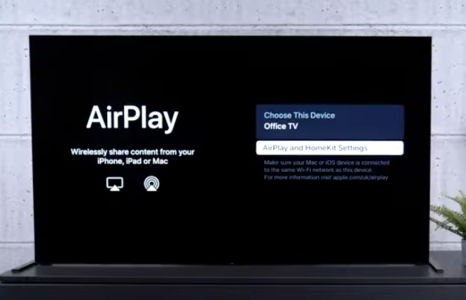Is your phone at risk? 1.8 billion users warned to turn off this dangerous setting immediately
- Replies 0
If you own an iPhone—or any Apple device, for that matter—this is one alert you can’t afford to ignore.
Recent discoveries by cybersecurity experts have revealed a series of dangerous flaws in Apple’s popular AirPlay feature, putting as many as 1.8 billion iPhone users (and millions more with iPads, Macs, and Apple TVs) at risk.
Even if you’re diligent about software updates, you could still be vulnerable. Here’s what you need to know, what you should do right now, and why this matters for everyone.
What’s Going On? The AirPlay Flaw Explained
AirPlay is Apple’s handy tool that lets you wirelessly stream music, photos, and videos from your iPhone or iPad to your TV, speakers, or other smart devices. It’s a feature many use daily—sometimes without even realizing it’s running in the background.
But here’s the catch: cybersecurity researchers at Oligo Security have uncovered 23 separate vulnerabilities in AirPlay, some of which are so serious that hackers could use them to take over your device, steal your personal information, or even spread malware to other devices on your home Wi-Fi network.
The researchers have dubbed these flaws “AirBorne” because the attacks can spread wirelessly, jumping from one device to another on the same network.

How Could This Affect You?
Let’s break it down:
- If a hacker manages to get onto your Wi-Fi network—say, at a coffee shop, hotel, or even your own home—they could exploit these AirPlay flaws to:
If these devices aren’t updated by their manufacturers, they could remain vulnerable for years—or forever.
Also read: iPhone users beware: Hackers can steal your data with this bug—learn how to defend your phone now!
Didn’t Apple Fix This?
Yes and no. Apple responded quickly after Oligo Security reported the flaws, releasing software updates for iPhones, iPads, Macs, and even the new Apple Vision Pro on March 31.
If you’ve updated your Apple devices since then, you’re much safer.
But here’s the problem:
Source: Tec2Check / Youtube.
How to Protect Yourself—Right Now
1. Update All Your Apple Devices
- Go to Settings > General > Software Update and install the latest version.
- Do this for every iPhone, iPad, and Mac in your household.
2. Turn Off AirPlay If You Don’t Use It
- Even if you’re up to date, disabling AirPlay adds an extra layer of protection—especially if you rarely use it.
- Here’s how:
- Open the Settings app on your iPhone or iPad.
- Tap “General,” then “AirPlay & Handoff” (or “AirPlay & Continuity”).
- Tap 'Automatically AirPlay' and select “Never.”
- On a Mac, open System Settings > General > AirPlay & Handoff, and turn off AirPlay Receiver.
3. Check Your Other Devices
- Do you have a smart TV, speaker, or streaming box that supports AirPlay? Check the manufacturer’s website for security updates.
- If updates aren’t available, consider disconnecting these devices from your Wi-Fi or disabling AirPlay on them.
4. Be Cautious on Public Wi-Fi
- Avoid using AirPlay or connecting to unknown Wi-Fi networks in public places.
- If you must use public Wi-Fi, consider using a VPN for extra security.
Frequently Asked Questions
Q: I’ve never used AirPlay. Am I still at risk?
A: Yes. AirPlay is enabled by default on many Apple devices, and it can be running in the background even if you don’t use it. Disabling it is a smart move if you don’t need it.
Q: What if my TV or speaker doesn’t have an update?
A: If the manufacturer hasn’t released a patch, consider disconnecting the device from your Wi-Fi or turning off AirPlay. You can also contact the manufacturer to ask about updates.
Q: How do I know if my device has been hacked?
A: Signs include unexpected pop-ups, apps you didn’t install, slow performance, or your device acting strangely. If you suspect a problem, update your device, run a security scan, and consider seeking professional help.
Next read: iPhone warning: A silent threat may already be on your device

Have you ever experienced a tech scare or had trouble updating your devices? Do you have tips for keeping your digital life secure? Share your stories and questions in the comments below!
Recent discoveries by cybersecurity experts have revealed a series of dangerous flaws in Apple’s popular AirPlay feature, putting as many as 1.8 billion iPhone users (and millions more with iPads, Macs, and Apple TVs) at risk.
Even if you’re diligent about software updates, you could still be vulnerable. Here’s what you need to know, what you should do right now, and why this matters for everyone.
What’s Going On? The AirPlay Flaw Explained
AirPlay is Apple’s handy tool that lets you wirelessly stream music, photos, and videos from your iPhone or iPad to your TV, speakers, or other smart devices. It’s a feature many use daily—sometimes without even realizing it’s running in the background.
But here’s the catch: cybersecurity researchers at Oligo Security have uncovered 23 separate vulnerabilities in AirPlay, some of which are so serious that hackers could use them to take over your device, steal your personal information, or even spread malware to other devices on your home Wi-Fi network.
The researchers have dubbed these flaws “AirBorne” because the attacks can spread wirelessly, jumping from one device to another on the same network.

Cybersecurity researchers have warned that dangerous flaws in Apple’s AirPlay feature could allow hackers to infiltrate iPhones and other devices connected to the same Wi-Fi network. Image source: Sony Europe / Youtube.
How Could This Affect You?
Let’s break it down:
- If a hacker manages to get onto your Wi-Fi network—say, at a coffee shop, hotel, or even your own home—they could exploit these AirPlay flaws to:
- Install malware on your iPhone, iPad, or Mac
- Steal sensitive data, like passwords, emails, or photos
- Listen in on your conversations
- Crash your device or take control of it remotely
- Use your device as a “stepping stone” to attack other gadgets on your network
If these devices aren’t updated by their manufacturers, they could remain vulnerable for years—or forever.
Also read: iPhone users beware: Hackers can steal your data with this bug—learn how to defend your phone now!
Didn’t Apple Fix This?
Yes and no. Apple responded quickly after Oligo Security reported the flaws, releasing software updates for iPhones, iPads, Macs, and even the new Apple Vision Pro on March 31.
If you’ve updated your Apple devices since then, you’re much safer.
But here’s the problem:
- Many people don’t update their devices right away (or at all).
- Third-party AirPlay devices (like smart TVs and speakers) may not get updates promptly—or ever.
- If even one device on your network is unpatched, it could be used as a “back door” for hackers to reach your other devices.
Source: Tec2Check / Youtube.
How to Protect Yourself—Right Now
1. Update All Your Apple Devices
- Go to Settings > General > Software Update and install the latest version.
- Do this for every iPhone, iPad, and Mac in your household.
2. Turn Off AirPlay If You Don’t Use It
- Even if you’re up to date, disabling AirPlay adds an extra layer of protection—especially if you rarely use it.
- Here’s how:
- Open the Settings app on your iPhone or iPad.
- Tap “General,” then “AirPlay & Handoff” (or “AirPlay & Continuity”).
- Tap 'Automatically AirPlay' and select “Never.”
- On a Mac, open System Settings > General > AirPlay & Handoff, and turn off AirPlay Receiver.
3. Check Your Other Devices
- Do you have a smart TV, speaker, or streaming box that supports AirPlay? Check the manufacturer’s website for security updates.
- If updates aren’t available, consider disconnecting these devices from your Wi-Fi or disabling AirPlay on them.
4. Be Cautious on Public Wi-Fi
- Avoid using AirPlay or connecting to unknown Wi-Fi networks in public places.
- If you must use public Wi-Fi, consider using a VPN for extra security.
Frequently Asked Questions
Q: I’ve never used AirPlay. Am I still at risk?
A: Yes. AirPlay is enabled by default on many Apple devices, and it can be running in the background even if you don’t use it. Disabling it is a smart move if you don’t need it.
Q: What if my TV or speaker doesn’t have an update?
A: If the manufacturer hasn’t released a patch, consider disconnecting the device from your Wi-Fi or turning off AirPlay. You can also contact the manufacturer to ask about updates.
Q: How do I know if my device has been hacked?
A: Signs include unexpected pop-ups, apps you didn’t install, slow performance, or your device acting strangely. If you suspect a problem, update your device, run a security scan, and consider seeking professional help.
Next read: iPhone warning: A silent threat may already be on your device
Key Takeaways
- Cybersecurity researchers have warned that dangerous flaws in Apple’s AirPlay feature could allow hackers to infiltrate iPhones and other devices connected to the same Wi-Fi network.
- Oligo Security discovered 23 AirPlay vulnerabilities, with some allowing attackers to deploy malware and take full control of devices, especially if those devices are not updated.
- Apple has released software updates to patch these security holes, but many third-party AirPlay-compatible devices may remain at risk if not updated by their manufacturers.
- Users are advised to ensure all their Apple and third-party AirPlay devices have the latest updates installed, and for extra security, to consider disabling AirPlay if not needed.
Have you ever experienced a tech scare or had trouble updating your devices? Do you have tips for keeping your digital life secure? Share your stories and questions in the comments below!






